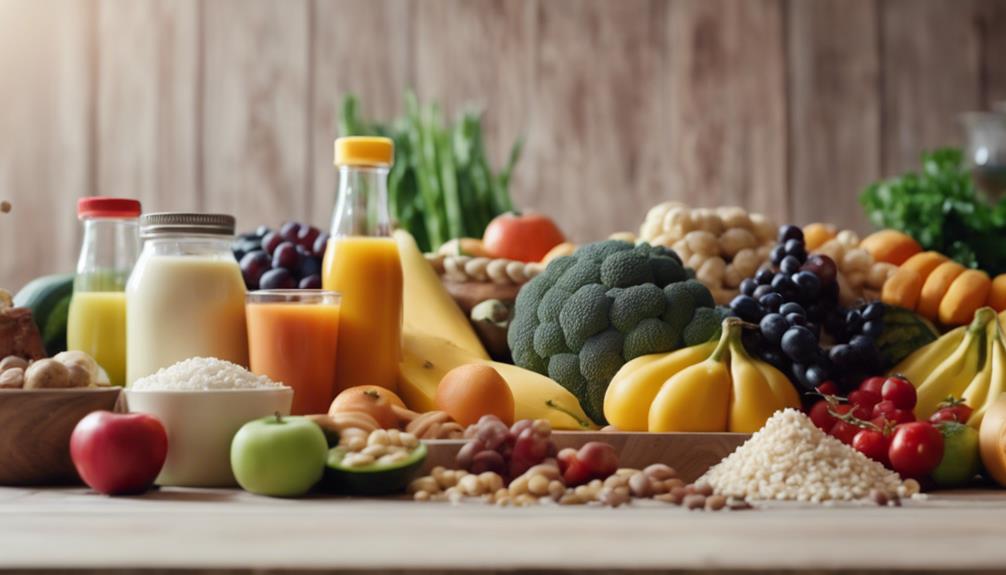Master important tips for feeding your baby to ensure they receive optimal nutrition and promote bonding. Breastfeed your newborn 8-12 times a day, making sure they spend 15 minutes on each breast. Hold your baby tummy to tummy to help with their latch and create a comfortable feeding experience. Deal with any soreness promptly and seek assistance if needed. Be alert for growth spurts that may require increased feeding. Create a positive feeding atmosphere by maintaining eye contact and staying emotionally close to your baby. Establish regular feeding schedules and pay attention to their cues of satisfaction. Do not hesitate to ask for help from consultants or healthcare providers if you have any concerns. By following these tips, you are supporting your baby’s overall well-being and growth.
Key Takeaways
- Breastfeed newborn 8-12 times daily for proper nutrition and bonding.
- Ensure correct positioning and latch-on to prevent soreness and ensure effective feeding.
- Recognize signs of growth spurts for increased feeding demands.
- Respond promptly to hunger cues and create a positive feeding environment.
- Seek help for breastfeeding challenges and monitor baby's feeding satisfaction.
Breastfeeding Frequency and Duration
Breastfeed your newborn 8-12 times a day to guarantee they receive sufficient nutrition and meet their needs.
During each nursing session, aim for at least 15 minutes on each breast to make sure your baby receives hind milk, which is rich in essential fats and nutrients.
It's important to respond promptly to your baby's hunger cues, as this helps establish a healthy breastfeeding routine.
Sometimes, babies may want to feed more frequently during growth spurts, so be attentive to their needs and offer them the breast whenever they show signs of hunger.
Correct Positioning and Latch-On
Guaranteeing accurate positioning and a proper latch-on during breastfeeding is crucial for both you and your baby's comfort and milk transfer efficiency. Positioning your baby tummy to tummy helps achieve a correct latch, where their mouth covers both the nipple and areola. This technique ensures effective milk transfer and reduces the risk of sore nipples. Supporting your breast with your hand or a pillow can also aid in maintaining a good latch throughout the feeding session.
To confirm a successful latch, watch for cues such as your baby's chin touching the breast, rhythmic sucking, and relaxed hands. These signs indicate that your baby is positioned well and nursing effectively.
In contrast, signs of a poor latch might include sore nipples, clicking sounds during feeding, or your baby appearing unsatisfied after nursing. By paying attention to these details and adjusting positioning as needed, you can enhance both your breastfeeding experience and your baby's nourishment.
Signs of Poor Latch and Soreness

If you experience soreness or clicking sounds while breastfeeding, it could be a sign of a poor latch.
A shallow latch may lead to discomfort for both you and your baby during feeding sessions.
Ensuring a proper latch is essential for effective milk transfer and preventing nipple soreness.
Latch Troubleshooting Tips
To troubleshoot latch issues, pay attention to signs of a poor latch such as sore nipples and clicking sounds during breastfeeding. A proper latch is essential for effective milk transfer and preventing nipple pain.
If you notice any discomfort or hear clicking noises while your baby feeds, it may indicate that the latch needs adjustment. An incorrect latch can lead to feeding issues and impact milk supply. Make sure that your baby's mouth covers enough of the areola to support ideal milk flow.
If you're experiencing latch difficulties, consider seeking assistance from a lactation consultant. They can provide guidance and support to help you achieve a correct latch and improve your breastfeeding experience.
Addressing Soreness Concerns
Addressing soreness concerns while breastfeeding involves recognizing signs of a poor latch, such as sore nipples and clicking sounds, to guarantee a comfortable feeding experience. Soreness during breastfeeding can signal that the baby isn't latching correctly, leading to discomfort for the mother and potential issues with milk transfer. It's important to address these concerns promptly to prevent nipple damage and ensure a positive breastfeeding experience.
Seeking assistance from a lactation consultant can provide valuable guidance on improving latch techniques and reducing soreness. Proper positioning of the baby and ensuring a good latch are essential for preventing nipple soreness and facilitating efficient milk transfer. By being attentive to these signs and seeking support when needed, you can enhance the comfort and effectiveness of breastfeeding for both you and your baby.
Supporting the Breast During Feeding
Properly supporting the breast during feeding is essential for preventing discomfort and promoting a successful breastfeeding experience. Here are some tips to help you achieve ideal breast support:
- Use a Nursing Pillow: Utilize a nursing pillow or a rolled-up towel to support your baby at the correct height for feeding. This can assist in maintaining a comfortable position for both you and your baby.
- Promote a Better Latch: Proper breast support can lead to a better latch for your baby, which is important for effective milk transfer. Supporting your breast adequately can enhance the breastfeeding experience for both you and your little one.
- Maintain a Secure Position: Support the breast with one hand and the baby with the other hand during feeding. This technique can help you maintain a secure and comfortable position, reducing the risk of discomfort for you and your baby.
- Prevent Nipple Damage: Adequate breast support can reduce the risk of nipple damage, ensuring a smoother breastfeeding journey. By providing proper support, you can minimize discomfort and promote a successful breastfeeding relationship.
Recognizing Growth Spurts

Recognizing growth spurts in your baby is essential for understanding their changing feeding needs. Typically occurring around 2 weeks, 6 weeks, and 3 months of age, these spurts may lead to increased hunger and more frequent feedings.
Growth Spurt Signs
Identifying signs of growth spurts in your baby is essential for understanding their changing feeding needs. Here are some key indicators to help you recognize when your little one might be going through a growth spurt:
- Increased Feedings: If your baby suddenly seems hungrier and wants to nurse more frequently, this could be a sign of a growth spurt.
- Fussiness: Babies going through growth spurts may become fussier than usual, seeking more comfort and closeness during feeding times.
- Shorter Naps: You may notice that your baby's nap times are shorter during a growth spurt as they wake up more frequently to eat.
- More Frequent Nursing: Babies experiencing growth spurts might want to nurse every 1 to 1½ hours to help meet their increased nutritional needs.
Recognizing these signs and responding to your baby's increased feeding demands during growth spurts is vital for supporting their development and ensuring your milk supply meets their growing requirements.
Managing Feeding Demands
Understanding and responding to your baby's increased feeding demands during growth spurts is crucial for supporting their development and guaranteeing they receive adequate nutrition.
Babies typically experience growth spurts around 2 weeks, 6 weeks, and 3 months of age. During these times, they may show signs of wanting to feed more frequently, sometimes every 1 to 1 1/2 hours. This increased feeding is beneficial as it helps boost milk supply to meet your baby's growing needs.
Recognizing and responding to these growth spurts can help you meet your baby's changing feeding demands effectively. Consulting a healthcare provider during these periods can provide you with guidance on ensuring your baby is receiving enough nutrition and support.
Feeding Cues and Patterns
Pay attention to your newborn's early hunger cues like rooting, hand-sucking, or turning towards the breast to guarantee timely and adequate feedings. Understanding your baby's signals can help you establish a feeding routine that aligns with their needs.
Here are some essential tips to take into account:
- Recognize signs of hunger: Be attentive to subtle cues such as increased alertness, lip-smacking, or sucking motions, indicating your baby is ready to feed.
- Adjust feeding frequency: Newborns typically require 8 to 12 feedings a day to fulfill their nutritional requirements, but this may vary based on individual needs.
- Monitor stomach capacity: Babies' stomachs grow over time, allowing them to consume more milk in fewer sittings. Trust your baby's ability to self-regulate their intake.
- Responsive feeding: Instead of adhering strictly to a feeding schedule, respond promptly to hunger cues and signs of fullness to make sure your baby receives adequate nutrition throughout the day.
Bonding During Feedings

During feedings, remember to maintain eye contact with your baby to strengthen your bond.
Skin-to-skin contact is also essential for promoting a strong connection between you and your little one.
These simple actions can enhance the emotional bond you share, fostering feelings of closeness and security.
Eye Contact Bonding
Maintaining eye contact with your baby while feeding consistently enhances bonding and communication. Here are some key benefits of eye contact bonding during feedings:
- Promotes Security: Eye contact during feedings can promote feelings of security and trust between you and your baby. This sense of security can help your baby feel more at ease and comfortable during meal times.
- Enhances Connection: Making eye contact while feeding can help your baby feel more connected and engaged. This connection is crucial for building a strong parent-child relationship and fostering emotional well-being.
- Strengthens Bonding: Bonding through eye contact during feedings can strengthen the bond between you and your baby. It creates a special moment of shared interaction that can deepen your connection with your little one.
- Creates Comfort: Establishing eye contact during feedings can create a comforting and reassuring environment for your baby. This sense of comfort can make meal times more enjoyable and pleasant for both you and your baby.
Skin-To-Skin Connection
Fostering the parent-child bond through skin-to-skin connection during feedings is crucial for promoting emotional closeness and well-being. Skin-to-skin contact not only enhances bonding but also helps regulate the baby's body temperature, promoting relaxation during feeding sessions.
This physical closeness releases oxytocin, often referred to as the bonding hormone, further strengthening the parent-child relationship. Additionally, babies who experience skin-to-skin contact while feeding tend to breastfeed for longer durations and show improved weight gain.
The benefits extend beyond the baby, as this connection also aids in reducing stress levels in both the infant and the parent, creating a more soothing feeding environment. Embracing skin-to-skin contact during feedings can contribute significantly to the overall well-being of both you and your baby, fostering a nurturing and secure bond that lays a strong foundation for future interactions.
Consistent Feeding Routines

Establishing consistent feeding routines is crucial for helping your baby feel secure and develop healthy eating habits. To guarantee your baby thrives, follow these key points:
- Regulate Hunger Cues: Consistency in feeding times can help regulate your baby's hunger cues, preventing overeating or undereating.
- Promote Better Sleep: A regular feeding schedule can promote better sleep patterns for your little one, leading to improved rest for both baby and parents.
- Reduce Fussiness: Following consistent feeding routines can reduce fussiness in newborns, making meal times more pleasant for everyone involved.
- Enhance Digestion: By sticking to a feeding schedule, you can improve digestion in your baby, reducing issues like gas and discomfort.
Seeking Help When Needed

If you encounter challenges with breastfeeding, seeking help from lactation consultants can provide valuable guidance and support. Lactation consultants are trained professionals who can assist you in addressing issues such as pain, latch problems, or concerns about your baby's feeding.
Don't hesitate to reach out if you're experiencing difficulties. Additionally, if your baby is showing little interest in feedings or having trouble gaining weight, it's vital to contact your healthcare provider promptly. These professionals can offer further advice and assistance to guarantee your baby's health and well-being.
Partners can also play an essential role in supporting breastfeeding efforts by attending lactation consultant meetings and learning how to assist with feedings. Consistent feeding routines and methods among caregivers can help establish successful feeding habits and promote a positive breastfeeding experience for both you and your baby.
Monitoring Baby's Feeding Satisfaction
When monitoring your baby's feeding satisfaction, observe for signs of contentment and relaxation during feedings to confirm they're receiving adequate nourishment.
Here are some key points to keep in mind:
- Look for cues like contented body language and releasing the breast or bottle voluntarily to indicate a satisfied feeding.
- A well-fed baby will exhibit good weight gain, produce an adequate number of wet diapers, and show normal growth and development.
- Pay attention to signs such as slowing down sucking, turning away from the breast or bottle, and having a relaxed grip while feeding.
- Babies may fall asleep or stop feeding when full, signaling their satisfaction with the meal.
Frequently Asked Questions
What Are the 5 Most Important Things I Need to Know About Taking Care of Infants?
To care for infants, remember to feed them 8-12 times daily, recognize hunger signs like rooting and hand-to-mouth gestures, and consult your pediatrician for breastfeeding or formula advice. Stay vigilant about feeding frequency and weight gain.
What Do New Parents Need to Know About Bottle Feeding Their Baby?
When bottle feeding your baby, choose the right bottle and nipple, monitor intake, sterilize regularly, and hold baby upright. Enjoy sharing feeding duties and keeping your little one healthy and happy. It's a rewarding experience for both of you!
What Should the Mother Be Taught Regarding Infant Feeding?
You should learn about breastfeeding benefits, latch techniques, hunger cues, and your own nutrition for successful infant feeding. Understanding challenges like low milk supply or latch issues will help you seek timely support from lactation consultants if needed.
What Are the Recommendations for Infant Feeding Practices?
When it comes to infant feeding practices, consider recommendations from the American Academy of Pediatrics. Breastfeeding for the first 6 months is advised, as it provides essential nutrients and antibodies for best health.
Conclusion
To sum up, mastering the art of baby feeding is a journey filled with learning and growth. By following these essential tips, you can guarantee a positive feeding experience for both you and your little one.
Remember, each baby is unique, so don't hesitate to seek help and guidance when needed. Stay informed, stay patient, and most importantly, enjoy the special bonding moments that feeding time brings.
Happy feeding!










